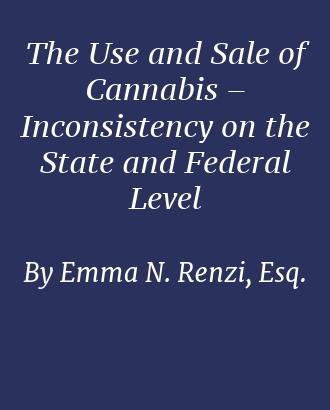The Use and Sale of Cannabis – Inconsistency on the State and Federal Level
By Emma N. Renzi, Esq.
Adult use cannabis, or recreational marijuana, was legalized under New York State law in March of 2021—when then-Governor Andrew Cuomo signed the Marijuana Regulation and Taxation Act (“MRTA”).[1]
The MRTA added a new Chapter 7-a (the “Cannabis Law”) to New York State consolidated laws; and created both an Office of Cannabis Management (“OCM”) and a Cannabis Control Board to facilitate business licenses and develop cannabis regulations. The MRTA also expanded on protections for medical-use cannabis, originally provided for in the Compassionate Care Act (“CCA”) of 2014. In addition to other cannabis use protections provided under the MRTA, the medical use of cannabis based on the recommendation of a physician was designated as a “disability” that one’s employer cannot discriminate against—absent specific exceptions. [2]
The federal approach to cannabis use, by contrast, is far less clear. Statutorily speaking, cannabis remains a Schedule 1 Controlled Substance under the Controlled Substances Act (“CSA”).[3] The CSA defines a Schedule 1 Controlled Substance as having a “high potential for abuse”—with “no currently accepted medical use in treatment in the United States;” and having a “lack of accepted safety for use…under medical supervision.” And under the CSA, the use of cannabis is unlawful—with no medical exceptions.
Yet, while federal law clearly makes the use of cannabis unlawful, with more states adopting laws legalizing the use of cannabis, the federal government appears to have become less inclined over the past decade to actually enforce its own prohibitions against the use of the substance.
As early as 2013, for example, the Department of Justice (“DOJ”) issued a memorandum (the “Cole Memo”) announcing that the DOJ would no longer seek to prosecute marijuana charges—other than certain specified charges that were considered of particular importance to the federal government.[4] And while the DOJ issued another memorandum in 2018 (the “Sessions Memo”) rescinding the Cole Memo—and confirming the federal government’s right to prosecute marijuana charges[5]—since 2014 the so-called “Rohrabacher-Farr Amendment” has been added to all omnibus spending bills. That amendment prevents the DOJ from using federal funding to prosecute those who use cannabis in compliance with a state’s medical marijuana laws.[6] Most recently, the Rohrabacher-Farr amendment language[7] was added to federal funding legislation that President Joe Biden signed into law on March 9, 2024.
The federal government’s continuing prohibition against using federal funding to enforce the CSA suggests a federal intention to defer to states on the matter of marijuana regulation. But because the amendment is not a long-term solution; is only enforceable if it is renewed in each year’s spending bill; and only protects against medical marijuana use, uncertainty with respect to use of cannabis under federal law remains.
In addition to the uncertainty faced by marijuana users, moreover , financial institutions and business owners involved in the cannabis industry must also grapple with the current lack of clarity concerning the federal regulation of marijuana. Financial institutions, for example, are currently subject to federal laws and regulations that prohibit the handling of proceeds from unlawful activities—and require that financial institutions have policies to ensure clients are not involved in unlawful activities.[8] Further, financial institutions are required to file suspicious activity reports (“SARs”) with the Financial Crimes Enforcement Network (“FinCEN”) when suspicions arise that a transaction is derived from unlawful activities. Given that the use and sale of marijuana falls within such “unlawful” activities under the CSA, therefore, financial institutions may take on significant risk when they decide to lend to state-authorized marijuana businesses.
There is very little official guidance available for financial institutions and businesses to rely upon; and those engaging in financial transactions involving marijuana businesses should carefully consider how to best mitigate that risk.
Notably, the Secure and Fair Enforcement Regulation Banking (“SAFER”) Banking Act, which passed the Senate Banking Committee in September 2023 with bipartisan support, would provide financial institutions with a “safe harbor” from penalties that could otherwise result from providing financial services to state-authorized marijuana businesses.[9] Under this legislation, proceeds from marijuana activities authorized by a state would not be treated as proceeds from an unlawful source—and income from state-authorized marijuana businesses would be treated like all other lawful income sources for participation in certain mortgage programs. It would also require FinCEN to issue guidance on filing SARs related to marijuana—helping to normalize financial transactions in the cannabis business.
As cannabis laws continue to evolve, new federal legislation and guidance is required to ensure a clear long-term solution to the discrepancy between federal and state government regulation of marijuana. There appears to be momentum at the federal level to resolve this issue, including with the federal Drug Enforcement Administration, which is considering rescheduling cannabis as a Schedule III drug. Additional federal changes, however, would go a long way to remove uncertainty and ensure that cannabis users, business owners and financial institutions can avoid any pitfalls associated with this area of law.
[1] L 2021, ch 92
[2] N.Y. Cannabis Law § 127, N.Y. Labor Law § 201-d; N.Y. Cannabis Law § 42; N.Y. Executive Law § 296
[3] 21 U.S.C.A. § 812
[4] Guidance Regarding Marijuana Enforcement, DOJ Memorandum [August 29, 2013], Nuance Communications, Inc. (justice.gov).
[5] Marijuana Enforcement, DOJ Memorandum [January 4, 2018]; Office of Public Affairs | Justice Department Issues Memo on Marijuana Enforcement | United States Department of Justice.
[6] H.R. 83, Consolidated and Further Continuing Appropriations Act, 2015.
[7] H.R. 4366, Consolidated Appropriations Act, 2024.
[8] See e.g., 18 U.S.C.A. §§ 1956, 1957
[9] S. 2860, Secure and Fair Enforcement Regulations Banking Act.
